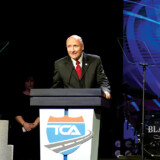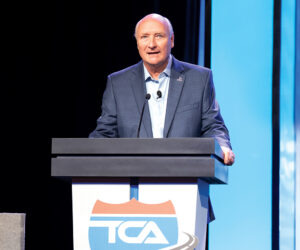
Truckload Carriers Association (TCA) Chairman Jim Ward is heading into the final weeks of his term, but he’s surely not slowing down. Coming off the success of Truckload 2021: Las Vegas and Bridging Border Barriers in Canada, the chairman still has several trips to the TCA headquarters in Alexandria, Virginia, to plan future events, including Truckload 2022: Las Vegas, which will mark the second time he’s moderated convention sessions. Then, as you’ve probably have heard by now, he will step from the role of TCA chairman into the role of TCA president. Between trips, meetings, and the presidential selection process, he took the time talk about the $1 trillion bipartisan infrastructure plan and how the $110 billion targeted for roads and bridges will impact trucking. He also comprehensively shared the associations’ position on the gas tax-vehicle miles traveled debate.
Mr. Chairman, we hope you and your family had a merry Christmas and a happy New Year. As you enter the home stretch of your term as chairman, what does your schedule look like for January and February?
The second week of January, I will be at TCA headquarters, meeting with the leadership of TCA’s Refrigerated Division as they plan their 2022 event in Traverse City, Michigan. In the fourth week, John Lyboldt, John Elliott, and I will meet in Alexandria to plan for my passing of the Chairman gavel to John Elliott at the convention in March.
In February, we hope to oblige current American Trucking Associations Chair and TCA member Harold Sumerford Jr. of J&M Tank Lines and take him up on his offer to host a meeting at his facility in Birmingham, Alabama. The remainder of the time will be spent working on tying up any loose ends for Truckload 2022: Las Vegas.
Since we last spoke, there has been a major development in transportation as the House and Senate passed President Joe Biden’s $1 trillion bipartisan infrastructure plan and, in a bipartisan ceremony November 15, the president signed the bill into law. The plan will put $550 billion in new money into transportation, broadband, and utilities, including $110 billion for roads, bridges, and other projects. What are the key provisions of this bill that will help the trucking industry?
We can’t overlook the funding — $110 billion is a lot of money to repair and rebuild the first-class office space that our professional truck drivers deserve. To put it into perspective, the Highway Trust Fund, which supports our roads and bridges, annually commits approximately $45 billion to necessary roadwork across the country, so the immediate funding this bill generates is greater than two years’ worth of investments.
Bills of this magnitude are usually spoken about in a sense of what is in the bill, but there are times when what is left out of the language is equally as important. The absence of the PRO Act in the infrastructure can be hailed as a victory by this industry because of the threat it could have had on the highly successful independent contractor business model. This demonstrates the association’s ability to message; TCA membership and staff were quick to voice industry opposition to the issue. The PRO Act can always reappear in future legislation, but the very fact that it was omitted from this bill is a great success.
Biden has touted the bill as a long-term plan, with projects and programs stretching out as long as 10 years. What are the most urgent needs in the eyes of trucking industry?
I don’t think it is a state secret that our nation’s roads and bridges are deteriorating. In fact, the American Society of Civil Engineers consistently refers to the state of disrepair our infrastructure is in. As an issue that has been circulating since the 2016 presidential election, the need for an investment into our interstate network certainly represented the most urgent need and served as the very basis upon which this bill was formulated.
The infrastructure bill would transfer money to the Highway Trust Fund to keep it solvent, including $90 billion for highways and $28 billion for mass transit. Given the dwindling resources in the Trust Fund and the increased push toward electric vehicles, some lawmakers have called for a transition to a vehicle-miles traveled (VMT) fee instead of a gas tax. What is the latest discussion among TCA members about a gas tax versus a VMT tax?
The fuel tax continues to represent the most cost-effective measure for collecting fees that would directly support our roads and bridges. Of course, with the increase in electric vehicles and the strides our industry and nation have made in fuel-efficiency standards, visits to the fuel pump are becoming less frequent. TCA continues to support an increase to the federal fuel tax program in an effort to raise the necessary dollars to keep the Highway Trust Fund solvent. However, through the work of our Highway Policy Committee, we have been proactive in keeping TCA at the forefront of conversations regarding a VMT tax. The committee has established a guidance document for these discussions surrounding whether a VMT would be a viable alternative and has identified some issues to consider when participating in these conversations.
For a VMT to be considered a viable alternative, the following issues must be addressed through additional research, studies, and pilot programs:
- The technological and administrative infrastructure is currently not in place to report and collect this tax or to prevent fraud in any VMT reporting system.
- The potential for dual taxation is high if the fuel tax is not fully phased out before the VMT goes into effect.
- The VMT as currently envisioned has a significantly higher administrative cost of collection when compared to the current federal fuel tax system, which has a proven, low-cost administrative and collection infrastructure.
- Past and present VMT pilot programs, including those in which TCA members like D.M. Bowman, Inc., have participated, lack adequate data to determine whether this is a reliable alternative on a national scale.
- While the trucking industry is accustomed to digital tracking through electronic logging devices and annual reporting of mileage to the state and federal government, private citizens are much more sensitive to the VMT’s privacy implications.
Also included in the bill is a provision to establish an apprenticeship program designed to encourage 18- to 20-year-olds to enter the industry as professional truck drivers. Where does TCA stand on this issue?
TCA supports and continues to champion the apprenticeship program that is reflective of the DRIVE Safe Act. This program allows carriers to expose their operations to a new demographic by presenting a rewarding career path for people when exiting high school, an opportunity that only previously existed for those who operated in intrastate freight. Not as simple as it sounds, of course, since there are training aspects and technical equipment specifications that would coincide with recruiting these individuals, but the opportunity to recruit younger drivers is one that our industry would embrace so that these potential employees can get more involved in our industry than before.
On the subject of professional truck drivers, the “Critical Issues in the Trucking Industry — 2021” report recently released by the American Transportation Research Institute, which is based on questionnaire responses by drivers and motor carrier executives, shows the industry’s Top 3 concerns are driver-related. No. 1 is the driver shortage (it has been the top concern the past five years); No. 2 is driver retention; and No. 3 is driver compensation. Do these rankings surprise you? What are the top strategies to address this concern?
I don’t think these things come as a surprise to anyone, especially in our segment of the industry. Recruiting and retaining drivers is just about the No. 1 goal for every trucking company these days, which also seems to coincide with increases in driver compensation. Tight capacity and the supply chain crunch don’t appear to be going away anytime soon, so carriers continue to stress the importance of finding drivers that will efficiently and safely move freight. I do not think a week goes by without hearing news of wage increases for the professional truck driver, and they are well deserved. Carriers establish pay programs that are practical for their own operations and drivers ultimately find a carrier that can satisfy their wage needs, so it really is not a one-size-fits-all approach, but rather one that each and every operation views differently.
New to the list of concerns, at No. 10, is a shortage of diesel technicians. What has happened to create such a shortage, and what has been the discussion among association members about how to address this concern?
This is an issue that continues to grow as the U.S. Bureau of Labor Statistics reported that employment of diesel service technicians and mechanics is projected to grow by 12%, faster than the average for all occupations. The agency also said 67,000 technicians will be needed to replace retired workers, and 75,000 new mechanics must be added to meet additional demand by 2022. This issue has been building for the better part of a decade, even before COVID-19 impacted the workforce. Retirement, natural attrition due to COVID, and even job-hopping has affected the industry in a manner that quality technicians are becoming harder and harder to recruit. Much like a professional truck driver, it continues to be a challenge finding people to enter an industry that desperately needs them. Not only do we have to identify and train more technicians, but we must continue to change the way people think about this kind of job. It remains a highly skilled profession and the opportunity for advancement is prevalent for those who choose to make this a career.
The mandate requiring companies with 100 or more employees to have a fully vaccinated workforce is scheduled to go into effect in January. Where does TCA stand on this issue, and how will it impact the motor carrier industry?
TCA remains committed to expressing the viewpoints of our industry on this issue, focusing on the dramatic change it could have on our driving force and exorbitant impact it would have on capacity in an already tight market. As such, we continue to stress the impractical demands that such a rule would have on our segment of the industry, especially for the drivers operating in an irregular route environment.
Obviously, the logistics of vaccinating an army of professional truck drivers in an irregular operating environment remains a strong concern. A larger fear is that a rule requiring a vaccine or weekly test could lead to a massive driver exodus from this great industry. Already faced with a shrinking pool of drivers from COVID-19 itself, we are all confronted with the pervasive challenge of locating qualified drivers to deliver our nation’s freight safely, effectively, and efficiently.
As part of an industry that continues to examine the impacts that this mandate, if enacted, could have, we continue to be part of the conversation in an effort to maintain our current level of drivers, not make it worse.
Recently there has been discussion within the industry about a shortage of truck parts. What are you hearing about this shortage, and what is the answer to alleviating the shortage?
Is there anything we are not experiencing a shortage of nowadays? The semiconductor shortage is wreaking havoc across the industry, and capacity is not helping the issue as people continue to wait for the parts they need. Unfortunately, this has become a sign of the times. Whether it is new equipment or replacement parts, backorders continue to be the standard message for today’s marketplace. It is important to continue keeping an accurate inventory of the parts that are needed and forecast on a wider variety of parts rather than a select few in order to keep your operation running effectively.
TCA participated in two important events during November — the Fifth Annual Bridging Border Barriers, held in Canada, and the transport of the U.S. Capitol Christmas Tree and the lighting of the tree in Washington, D.C. Why is it important for the association to participate in these events?
Both of these events were extremely well attended, which was great to see. Nearly 150 industry professionals participated live and in person at the Bridging Border Barriers event in Ontario, and the chatter on social media was superb.
Keeping up with current and potential cross-border issues is crucial; TCA and its sponsors know how important it is for like-minded colleagues to gather, and this top-notch event provides that opportunity. Additionally, thousands of people had the opportunity to visit “The People’s Tree” in our hometown of Williamsport, Maryland, during a “whistle stop.” The four-hour event provided the community with an opportunity to sign the banner that lined the tree, visit with local vendors, chat and have a photo with Santa and Mrs. Claus, purchase commemorative ornaments, and more. And to make the event even better, the Federal Motor Carrier Safety Administration’s Deputy Administrator Meera Joshi was in attendance and addressed the crowd about the importance of safety on our nation’s highways. She was very familiar with our community from participating in the JFK 50 mile run at least twice. We could not have envisioned a more memorable event.
Looking ahead to Truckload 2022: Las Vegas, the association recently announced two exciting program participants. The keynote speaker will be Ben Carson, a retired neurosurgeon who served as Secretary of Housing and Urban Development during the Trump administration and was a Republican presidential candidate during the 2016 primaries. The featured speaker will be Kevin Mitnik, a cybersecurity expert who will teach attendees how to avoid being hacked. Please share a word of encouragement for TCA members to go ahead now and register for the convention, and speak to the quality of speakers the association is able to attract to its convention.
Aside from our lineup of insightful speakers, the event will offer a revamped schedule so be sure to look at some of the changes. For example, committee meetings will no longer be held on just Sunday morning. Additionally, more networking opportunities have been added, including a March Madness Viewing Lounge in the exhibition hall so attendees can enjoy the games, beverages, and food while mingling with colleagues. Make plans to join us now — register at www.truckload2022.com.
In closing, Truckload 2022: Las Vegas will be John Lyboldt’s last convention as TCA president. How does the association plan to honor him at the event?
We want to make sure John and Lynne know how much we appreciate all they have done to support the membership and staff during his six-plus years as TCA president.
Thank you, Mr. Chairman.
Lyndon Finney’s publishing career spans over 55 years beginning with a reporter position with the Southwest Times Record in Fort Smith, Arkansas, in 1965. Since then he’s been a newspaper editor at the Southwest Times Record, served five years as assistant managing editor of the Arkansas Democrat-Gazette in Little Rock and from November 2004 through December 2019 served as editor of The Trucker. Between newspaper jobs he spent 14 years as director of communications at Baptist Health, Arkansas’ largest healthcare system. In addition to his publishing career he served for 46 years as organist at Little Rock’s largest Baptist church.



















